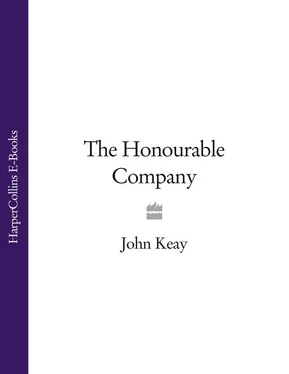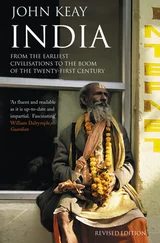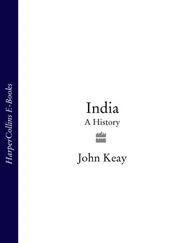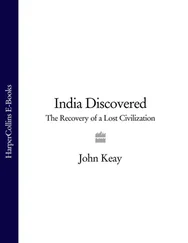Aldworth’s expectations of driving a brisk trade in broadcloth soon proved mistaken. Some was sold as horse blankets – or as their elephant equivalents – but in India as in Japan English tweed never caught on as human apparel. Nevertheless the Indian trade prospered. Indigo, the blue dye obtained from a species of vetch, and of course the usual cornucopia of Indian cottons were readily available and sold well both in the Indonesian archipelago and, increasingly, in England. The Merchant’s Hope, refitted after the Portuguese attack, was the first vessel to sail straight from Surat to England where her cargo of mainly cotton goods was quickly disbursed. Instead of English tweeds revolutionizing Eastern fashions, Indian cottons were about to invade English domestic life. Napkins and table-cloths, bed sheets and soft furnishings, not to mention underwear and dress fabrics, quite suddenly became indispensable to every respectable household. A new vocabulary of chintzes and calicoes, taffetas, muslins, ginghams and cashmeres entered everyday use. Having first invaded the larder, Eastern produce was about to take over the linen cupboard.
In 1614 the Indian trade was particularly profitable thanks to a temporary falling out between the Emperor and his Portuguese allies which led to an embargo on Portuguese shipping. Cottons became cheaper, indigo plentiful.
At about the same time the Company in London voted to end the system of a separate subscription for each voyage and to replace it with what is usually called the First Joint Stock (1613-16). The joint-stock principle of corporate investment had of course applied to the separate voyages; and in that some of these subscriptions had been extended to include a second voyage while others had been subject to long delays before they could be finally wound up, subscribers had seldom received the quick return which they had anticipated. The First Joint Stock, which was to finance a fleet every year for four years, did not therefore represent a very significant change from the shareholders’ point of view. As with subsequent issues – the Second Joint Stock (1617-22), etc – subscriptions were called in by yearly instalments and dividends paid out in the same way. But it did ensure greater continuity of investment; it enabled the Court of Committees to plan operations over a longer period; and, above all, it promised to end that spectacle, so prevalent at Bantam and to a lesser extent in India, of voyages undercutting one another and of rival factors squabbling over cargoes.
With a view to reorganizing and integrating its various overseas establishments in the light of this development, the Company dispatched William Keeling in 1614 with a supervisory authority to appoint regional Agents, later known as Presidents or Governors. A year later, with encouraging news of Best’s activities at Surat, the Company judged the time right to step up its investment in India; and to match Portuguese influence there, the directors hit on the idea of appealing to King James to appoint an ambassador to the court of Jehangir. This was a novel departure, especially in the context of oriental diplomacy which scarcely recognized commerce as a legitimate reason for accreditation. It seemed sensible enough, though, to King James, especially when the Company volunteered to meet all the ambassadorial expenses. Accordingly, armed with suitable presents and a long list of demands, in 1615 Sir Thomas Roe sailed for Surat. It was, according to most accounts, ‘the turning point in the history of the British in Western India’ and ‘a landmark in the relations between England and India’.
For once the directors had broken their resolution to consort only with ‘men of their own quality’. Roe, a courtier, diplomat and sometime Member of Parliament, described himself as ‘a man of quality’ which, as he proceeded to demonstrate, was a very different thing. When the Governor of Surat received him sitting down and advised him of the usual customs inspection and body search, Roe simply gathered up his entourage and returned to the fleet. Clearly the Indians did ‘not sufficiently understand the rights belonging to my qualitye’; for ‘my king’s honour was engaged more deeply than I did expect and I was resolved to rectifye all or lay my life and fortune both in the ground’. Too many money-grubbing factors – like Hawkins – had been posing as ambassadors. Roe had to make the difference in ‘quality’ plain. He saw his job as ‘repayring a ruined house and making streight that which was crooked’ by, in both speech and conduct, conveying an altogether more exalted and dignified impression of English society and sovereignty. He would make no secret of his contempt for India; it was ‘the dullest, basest place that ever I saw and maketh me weary of speaking of it’. Nor would he brook any nonsense from Moghul officials who ‘triumph over such as yield but are humble enough when they are held up’.
In such utterances there is more than a hint of that distasteful conviction of moral superiority which would one day characterize imperialistic jingo. And perhaps some sense of affinity with Roe explains the enormous importance attached to his mission in later accounts of British beginnings in India. But Roe’s posturing was based on ‘quality’ and class consciousness, not colour and race consciousness. If he was scathing about Jehangir’s subordinates he was no less disdainful of the English factors. In Gujarat, as at Bantam, representatives of the different Company voyages had been quarrelling. Roe was expected to act as peacemaker. In the event it was the universal distrust of his motives and conduct, plus the death of Aldworth (after two years of dysentery he was described as ‘more like an anatomy than a man’), which did most to unite the factors.
With matters of protocol at Surat still unresolved, Roe proceeded inland with a growing list of complaints to lay before the Emperor plus the terms of a rather one-sided treaty of trade and friendship which he hoped to persuade the Emperor to sign. His sobriety and high principles created a favourable impression. Jehangir ‘had never used any ambassadour with so much respect’, he reported. Aloof to the point of priggishness he shunned any imperial camaraderie that might prejudice his own dignity and proved more than a match for the Portuguese representatives. But during three long and weary years at court he failed to secure the desired treaty, he further alienated most of the Company’s factors, and he very nearly sabotaged the one encouraging development of the period. When his term of office ended he was generously applauded by both King and Company but it is significant that a successor was never sought and indeed Roe himself advised against it. ‘My qualitye either begets you enemies or suffers unworthily’, he told the directors; a consul on 1000 rupees a year ‘will serve you better than ten ambassadours’. Jehangir opposed any treaty that would impose limitations on his autocratic behaviour, and his court was no place for a selfless public servant; ‘no conversation,’ moaned Roe, ‘…no such entertainment as my qualitye requireth’.
In matters of trade the Ambassador’s commission forbade him to interfere with the English factors. Although he eventually prevailed on the Company to change this, and although he frequently expressed his commercial opinons with much cogency, they were neither consistent nor convincing. The man who is often credited with having established the Company’s affairs in India on a sound commercial basis in fact condemned what he called ‘the errour of factories’, advised against opening trade with Bengal and Sind (although he had at first favoured both and, from Masulipatnam, Antheuniss was strongly urging the case of Bengal) and took the gloomiest possible view of future prospects. Because English exports, other than bullion, were not in great demand in India, the trade ‘must fall to the ground by the weakness of its own legs’. ‘I hope not in success but I would not the failing were on my part’. At one point he was all for abandoning Surat as the main English port, at another he was asking for permission to build a fort there. Yet, in an oft quoted and supposedly prophetic passage, he strongly advised against fortified settlements. ‘If he [Prince Kurram, the future Shah Jehan] would offer me ten I would not accept one…for without controversy it is an errour to affect garrisons and land warrs in India’. He was thinking of the Portuguese whose ‘many rich residences and territoryes’ were the ‘beggering’ of their trade. ‘Lett this be received as a rule, that if you will profitt, seek it at sea and in quiett trade.’
Читать дальше












